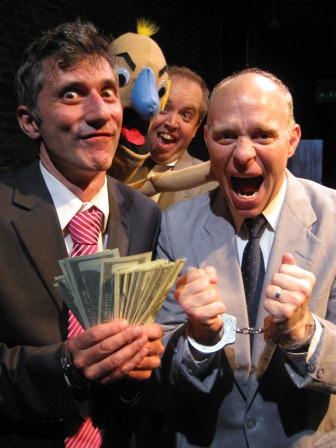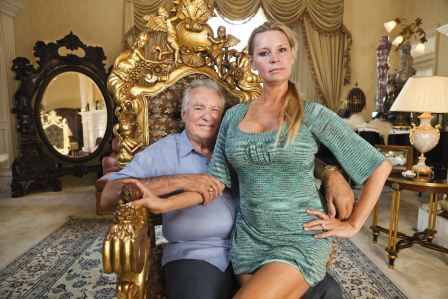If the Occupy Wall Street movement sharpened the distinction between the 1% and the 99%, Mitt Romney's recent candidacy opened a can of worms about exactly how the super-rich feel about the "moochers" and "takers" in the lower 47%. Robin Finn's recent article in The New York Times entitled The Ultimate Amenity: Grandparents puts a whole new spin on the costs of keeping a family together.
Earlier this year, OpenTab Productions presented the West Coast premiere of Enron 2012 by British playwright, Lucy Prebble. Using some superb puppets designed by Miyaka Cochrane, the production was directed by Ben Euphrat with a fury appropriate to the greedy tale of what happened to "the smartest guys in the room." When her play premiered in London in 2009, Prebble explained that her aim was:
"... to show the theatricality of business and the illusions on which it thrives. For Enron, business became a form of show business. They would hire Cirque du Soleil to perform at company parties. I learned that Jeffrey Skilling used to wake up at 4:00 a.m. thinking of all the pressure on him. I found it easy to relate to that since I used to do exactly the same when I was younger, thinking of all the lies I'd told and fantasies I'd created. Jeffrey Skilling transformed himself from a nerdy geek into the biggest showman of them all. In the opening scene, at an office party, I have Skilling explain the whole process of mark-to-market in which projected profits are treated as a tangible reality. It's motivated by Skilling's fury at business people who don't understand an accounting system used by all the big Wall Street investment banks. Enron's president had a messianic zeal and believed he could change the world by creating a virtual economy."
"Andy Fastow (Skilling's chief finance officer) was a fan of fantasy films and sci-fi. He gave Enron's shadow companies names like Raptor and Talon -- an idea I seized on so that on-stage raptors become a scary, sinister way of showing how Fastow's ideas spun out of control. When Fastow explains to Skilling how losses can be shifted on to shadow companies, the emotional drive comes from the fact that Fastow is desperate to impress his adored boss. In fact, it almost becomes a love scene between the two men."
When talk turned to deregulating California's energy market, I cringed with the memory of my electricity bill (which is now 40% of what it was when Enron was putting the squeeze on Governor Gray Davis). OpenTab's production featured excellent performances by Alex Plant as Jeffrey Skilling, Laurie Burke as Claudia Roe, and an actor named GreyWolf as Ken Lay.
However, the character which traveled the greatest dramatic distance was Andy Fastow, who was portrayed by Nathan Tucker with a level of rabid enthusiasm. As one watched Tucker frantically feeding debt to a trio of brilliantly-designed, screeching puppet raptors, one couldn't help but admire Prebble's wit and Euphrat's energetic stage direction.

Andy Fastow (Nathan Tucker) and Jeffrey Skilling (Alex Plante)
go for the money in Enron 2012
When it comes to the theatre's ability to dissect and depict what has caused recent wild swings of financial markets (as well as the global crises of the past two decades), those who had the opportunity to enjoy Bennett Fisher's excellent Hermes will quickly recognize Prebble's play as an appropriate companion piece.
* * * * * * * * * *
They say that timing is everything. In early October, David Siegel (the founder and CEO of Westgate Resorts) made headlines when he sent an email to his thousands of employees warning them that, if President Obama won re-election, their jobs were on the line. Several major CEOs took it upon themselves to follow Siegel's example. The only difference was that they hadn't been featured in a recent documentary showcasing their obscene levels of wealth.
Siegel (who claims to have played a major role in getting George W. Bush elected President) and his busty wife, Jackie, were well on their way to building their dream home in Orlando -- a 90,000 square-foot mansion modeled after the famous Palace at Versailles -- when the recession wiped out their main source of income (Westgate Resorts and Timeshares). Lauren Greenfeld's fascinating documentary, The Queen of Versailles, looks like a chapter of Lifestyles of the Rich and Famous after the wheels come off the rich people's bus.
Jackie, a boisterous 43-year-old shopaholic mother of eight children, was caught off guard when her 74-year-old husband's real estate empire took a huge financial hit. Even as she ordered her chauffeur to stop at McDonalds so she could pick up some fries, cutting back on spending was easier said than done.
Much of Greenfeld's jaw-dropping documentary will seem like red meat to the Occupy Wall Street movement as it examines how the 1% deal with financial setbacks during a recession. From the stuffed carcasses of old pets on display in glass cases to the high-priced tackiness of the Siegel residence, the moment in the film that gets the biggest laugh occurs when, after taking her brood on a commercial flight, Jackie arrives at a regional airport in upstate New York and asks the rental car service agent who her driver will be.
In the midst of the family's ongoing chaos, many strange moments fill the screen:
- As a severely depressed David sweats out the stock market, he can be seen brooding in his office/den, wanting to be left alone.
- As house staff are let go and pet care becomes less of a priority, the family must navigate around numerous dog droppings. "I didn't even know we had an iguana," notes one child upon discovering a dead lizard.
- At one point Jackie worries if the family's downward financial fall might even mean that her kids will have to go to college.
As Greenfield notes:
"In an age of cultural obsession with the rich, chronicled by reality TV (Keeping Up with the Kardashians, Real Housewives of Beverly Hills), I wanted to tell a deeper, cinema-verité story of an extraordinarily wealthy family that had the ambitious goal of building the biggest house in America.

David and Jackie Siegel pose in their 26,000 square foot
"starter mansion" for filmmaker Lauren Greenfield
After Jackie invited me to stay in their 26,000 square foot 'starter mansion' and life started to stray from all of our expectations, I was fortunate that Jackie and David had the courage to stay committed to the project and allow me to document their journey. As two remarkable individuals who had come from rags to riches and weathered many storms, they didn't fear this one. They understood, on some level, that their journey was a statement about the American Dream and the challenge the crisis posed for that dream."
The irony, of course, is that in many respects it is Jackie's ebullient personality that helps keep the family functioning (even if no one has strapped an Irish setter atop the limousine). The Queen of Versailles often comes across as an ill-timed ode to conspicuous consumption. Here's the trailer:
To read more of George Heymont go to My Cultural Landscape
